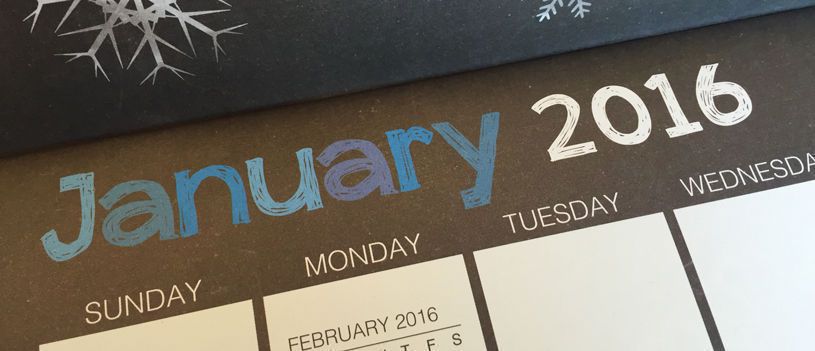4 reasons to learn a language this New Year
I don’t know about you, but I love New Year’s Eve. Not because of all the parties (twelve months ago I saw in the new year at home with a cup of tea, because I’m that cool), but because it’s a great time to set some new goals.
Of course, you can set goals any time, but there’s something special about the fresh start that comes with a new year. It’s like the first page of a brand new notebook; any previous failed attempts or mistakes are erased and you can start over with a clear target in mind.
Yesterday the British Council, supported by actor Larry Lamb, launched a #LearnALanguage campaign, which aims to get Brits learning a language in 2016.
And over 200 people will be doing just that with our free uTalk challenge, which starts tomorrow – learning everything from French to Wolof (there’s still time to join, by the way…).
But why should you learn a language this new year? Here are my top 4 reasons:
New friends
Everyone likes making new friends, and it’s a lot easier to do that if you speak the same language. Sometimes all it can take is one word to break the ice, so even if all you know is ‘hello’, ‘thank you’ or ‘where is the toilet?’ – hey, it’s a start. (And if you can speak a bit of Xhosa or Korean, it’s a great way to show off at parties and instantly become the coolest person in the room.)
New opportunities
The New Year is a time for new opportunities… and learning a language brings you so many. Travel the world. Get a new job. Meet the love of your life. As Larry Lamb says in this video, his enjoyment of languages directly led to his 40-year career as an actor – who knows where it could take you?
It’s good for your brain
A not so nice side effect of the New Year celebrations is the reminder that we’re a year older and time is passing far too terrifyingly quickly. So let’s grab the chance to help out our poor ageing brains; research has shown that bilingual people have better memories and are more successful at multitasking, and speaking a second language can delay the onset of dementia.
It’s fun
And sometimes, that’s the only reason you need. Discovering a new language and culture is one of the most fascinating and rewarding things you can do, and there really is nothing like the buzz you get the first time you have a conversation with someone – however basic – and the two of you understand each other.
So, which language will you learn in 2016?
Happy New Year everyone!
Liz
A history of languages in the USA
Last week, a report was published using a series of maps to show the distribution of languages besides English and Spanish in the USA. We thought it was really interesting to see the huge number of languages spoken in one country; it’s easy to assume one country means one (or maybe two) languages.
Here’s a fantastic infographic shared with us by FreePeopleSearch.org, which looks in more detail at the history, distribution and usage of languages in the USA. We hope you find it as interesting as we do!
How learning a language can help your career
 “Learning a different language has made me the person I am today. I enjoy working with global brands in over 18 different countries, and leading a team specialised in 5 different markets.”
“Learning a different language has made me the person I am today. I enjoy working with global brands in over 18 different countries, and leading a team specialised in 5 different markets.”
Sarah works as a Multilingual Search Manager at Search Laboratory, and she’s taken time out to tell us why and how learning a language has helped her develop her career.
Q. Your experience of learning a language…
– When did you start?
I started learning another language at the age of seven, when my family moved to Germany. I often say that I learnt the language by watching TV, but it was actually a combination of listening (which did involve TV), reading (mainly as schoolwork gave me no choice – I wasn’t the bookworm then that I am today), and being thrown in the deep end. If there’s no other communication option around you, you will pick up a language. It just might take some time.
– How did you get into languages?
I got into it through video tapes for children designed to help learn a second language, and then through tuition and being surrounded by the language in everyday life. For the first six months of living in Germany I went to an English school, but then transferred to a German one, so speaking the language was a must for grades, making friends, and just generally communicating.
– What was hard?
The first few months were pretty tricky. I’m known as a bit of a chatter-box (this is likely to come across in my answers), so not being able to communicate was tough, but also an incentive to just try the language and learn by doing. The best way to learn a language is to speak it. It’s also the scariest thing about learning a language.
These days the main challenge is remembering the right word for the right language. With two languages buzzing in my head, I can often recall the perfect word for what I want to say, but in the wrong language for the situation.
Q. How you have found being multilingual useful when searching for employment and building a career?
 Being multilingual has been very useful for my career, as it’s given me more options, and I think it’s also helped me stand out a bit in the employment crowd. This was especially true when I was younger, and just starting out. Though multilingual isn’t as unusual as you think these days.
Being multilingual has been very useful for my career, as it’s given me more options, and I think it’s also helped me stand out a bit in the employment crowd. This was especially true when I was younger, and just starting out. Though multilingual isn’t as unusual as you think these days.
It was also a way for me to narrow down my career search. I knew that I wanted to be part of a company that provided opportunities for multilingual speakers, and was equally interested in different cultures and understanding different markets.
Q. How do you use languages in your everyday role as a Multilingual Search Marketing Manager?
I manage our French, Spanish, Italian, Russian and Chinese team, so the language alone doesn’t help out; however, the language experience is vital. I feel that because I went through learning a language and living in a different country that I’m more empathetic to and understanding of the struggles of day to day life (or at least some of them – the team may disagree).
I also think that the language experience has made me very inquisitive about other cultures, and languages, which really comes in handy when looking into the differences of search behaviour and trends in other markets.
Q. Why do you think more people should learn more languages?
Because it’s great fun! And because it can open up career opportunities that you hadn’t even thought of yet.
I sometimes forget that I’m classed as multilingual as having more than one language is natural to me, to my family, and most of the people I work with. I think I’d be pretty bored if I only had one language to rely on.
Also, looking back and seeing all the opportunities I might have missed out on, is a bit of a scary thought.
I’m excited to learn more languages, though can’t decide of the languages which my team speaks, which one to start with. There’s just too much choice!
Do you use languages at work? Have you found knowing more than one language has helped you in your career?
A brief guide to English Office Jargon
Today’s post was contributed by Mark James, Copywriter at Crunch Accounting.
It’s been just over a year since I traded academia for the office, my three years spent studying English coming to an end and my career as a copywriter now starting to take shape.
 In that past year I’ve had to make an array of adjustments; getting used to waking when the sun comes up rather than when it goes down and trading clubbing plans for pension plans amongst the changes I’ve felt. Getting to grips with corporate lingo is something I’ve faced too – an English dialect of its own that can be just as baffling as Scouse or Geordie (perhaps even more so).
In that past year I’ve had to make an array of adjustments; getting used to waking when the sun comes up rather than when it goes down and trading clubbing plans for pension plans amongst the changes I’ve felt. Getting to grips with corporate lingo is something I’ve faced too – an English dialect of its own that can be just as baffling as Scouse or Geordie (perhaps even more so).
Concerned about its influence, the Plain English Campaign has tried to contain its spread, going so far as to say that it’s damaging the economy. That’s probably a tad extreme but there’s no doubt that office jargon’s causing contention, certain phrases creeping outside of the workplace and into our everyday language.
As such, if you’re planning on spending some time on these shores it might be a good idea to learn some of the basics. Here’s an overview of some of the most popular…
‘Touch base’
Heard in offices across the country, confusingly this doesn’t refer to playing baseball, it simply means to establish contact with someone, perhaps through telephone, email, or a meeting in person.
Example usage – ‘David, I think you ought to touch base with Boris. His political aspirations are getting way out of control.’
‘Going forward’
You’ll hear this in meetings a lot. Essentially, it translates as ‘in the future’. Why ‘in the future’ isn’t deemed good enough again confuses me, but hey ho, people seem to like using it.
Example usage – ‘I’ve got my eye on a Bugatti Veyron, so going forward I propose we cut costs and outsource to India.’
‘KPI’
An acronym which stands for ‘Key Performance Indicator’, you’ll often hear this in appraisals and the like. Basically, the term encompasses anything that management can use to manage the effectiveness of a strategy or, you as an employee.
Example usage – ‘For someone brought in to increase productivity by 200%, Tarquin’s KPIs are woefully low. Clear his desk whilst he’s away at lunch.’
‘Thinking outside the box’
This phrase must be a nightmare for a non-native speaker, as there’s no boxes involved, it simply means to think unconventionally.
Example usage – ‘To prosper in the global race, we’ll need to increasingly think outside the box.’
‘ROI’
Another acronym that I thought needed explaining, this stands for ‘Return On Investment’. Put simply, it refers to how much cash an investment in something like property or a marketing campaign reaps in the long term.
Example usage – ‘We invested £200 billion in subprime mortgages but our ROI appears to be less than 300 billionths of that. In other words, we need a government bailout.’
In my first year of office work, these five terms are the ones that I’ve come across the most. There’s many more though, as this article from the BBC reflects, and if an episode of The Apprentice is anything to go by, there’s plenty more where that came from. I’d start developing an office jargon app if I were you, EuroTalk…
Mark James is a Copywriter for Crunch Accounting. If you’d like to touch base with him going forward, find him on Twitter at @MarkJames891.
And if you’re interested in learning some business English, you might want to try Talk Business, which is available as a download or a CD-ROM. It may not include the jargon above, but it’s a good place to start!
Image credit – arenagroove
The Art of Interpreting
Kana Tsumoto has just finished her internship with us, translating and recording our maths app into Japanese. In this post, she explains why she’s excited about her chosen career in interpreting.
The other night when I stayed at a youth hostel, I had an uncomfortable conversation with one of my roommates. I told her how I just finished a university course in Translation and Interpreting and how I am about to embark on my new career as a translator/interpreter. Then, in a not so roundabout way, she started to criticise my future profession, describing it as a boring task; merely repeating what has already been stated but in a different language! I shouldn’t have let her get on my nerves, but she did. I endured this for three days, and on the fourth she left. The initial joy felt at her absence soon descended into shame. It suddenly dawned on me that I had been a massive coward! I had failed to stand up for my profession, failed to defend it against a misinformed foe! Since then, I have been composing in my mind a grand speech on how wonderful translating and interpreting is. I would like to take this opportunity to share this speech, and dedicate it to my roommate in 303.
 Interpreting is, in fact, very exciting and very demanding! You definitely do need an extremely good command of the language you are interpreting into/from, but surprisingly more important are other skills including for example research management skills, communication skills, a sense of conciseness and even drawing skills! I was flabbergasted myself by this when I first started the course. Let me go through some of these skills with you.
Interpreting is, in fact, very exciting and very demanding! You definitely do need an extremely good command of the language you are interpreting into/from, but surprisingly more important are other skills including for example research management skills, communication skills, a sense of conciseness and even drawing skills! I was flabbergasted myself by this when I first started the course. Let me go through some of these skills with you.
Communicating skills: Interpreting belongs to the service industry. So as a service, being able to communicate with your clients is a vital skill. Interpreters need flexible communication skills to survive in many different environments, such as court rooms and their tense atmosphere, to the bonhomie found at sales talks, or the acute technical details found at academic conferences.
Researching: Interpreters spend a significant amount of time on research. This takes place prior to the actual performance. An hour long session of interpreting can require days, even weeks, of research for it to be successful. Research allows the interpreter to familiarise themselves with the terminology and theories that are going to be employed during a speech or conference. Interpretation without research is in some cases impossible. If you don’t know what is being said then how can you translate?! A good interpreter immerses themselves within their particular field, becoming expert in their chosen subject.

Drawing skills: We interpreters are artists when it comes to taking notes. During consecutive interpreting, we usually make quick notes of the speech. But of course we don’t have much time for writing down stuff, nor can we spend much time looking at the notes when performing; we have to talk to the audience, not to our notes! So we take notes through the medium of drawing, or rather, in symbols! The symbols need to be simple enough to scribble down and meaningful enough to allow us to understand the logical flow and the details in just one glance.
Last but definitely not least…
Sense of conciseness: This, I find most difficult to improve (I’m going to have trouble explaining conciseness concisely, oh dear!… But here I go!). The best translation that suits the context and the intention of the speech may not be the translation you find in the dictionary. A good interpreter never burdens the audience with the task of trying to understand the interpretations; they are like a guide on a cruise liner, taking with them passengers for a seaside tour in the greatest of comfort. A bad interpreter however, forces their passengers to balance out the back of the boat on water skis, whilst showing them the same scenery. Exercising the skills of conciseness in the midst of interpreting is not an easy task, and it comes only through lots and lots of practice. It is an art form, and when it is done right it is beautiful!
As you can see, interpreting can be a very demanding job. It comes with everyday hard work. The process of striving for something and then accomplishing it is definitely exciting. Now put that in your pipe and smoke it, my roommate from the hostel! 😉
Kana


